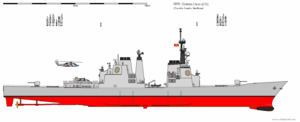Octeres-class cruiser: Difference between revisions
(Created page with "{|{{Infobox Ship Begin}} {{Infobox Ship Image |Ship image = File:NRI_Octeres_Class_CG.png |Ship caption = Octeres class }} {{Infobox Ship Class Overview |Name = ''Octeres'' Cl...") |
No edit summary |
||
| Line 61: | Line 61: | ||
}} | }} | ||
|} | |} | ||
The '''Octeres class''' of guided-missile cruisers is a class of warships in the New Roman Republic Navy, first ordered and authorized in the 1982 fiscal year. The class uses passive phased-array radar and was originally designed as an extended version of the [[Devistio-class destroyer|Devistio Class]]. The increased combat capability offered by the Scutum Combat System and the (AN/SPY-1) radar system, together with the capability of operating as a flagship, were used to justify the change of the classification of CG (guided-missile cruiser) shortly before the keels were laid down. | |||
Ticonderoga-class guided-missile cruisers are multi-role warships. Their Mk 41 VLS can launch cruise missiles to strike strategic or tactical targets, or fire long-range anti-aircraft missiles for defense against aircraft or anti-ship missiles. Their helicopters and sonar systems allow them to perform antisubmarine missions. Octeres-class ships are designed to be elements of carrier battle groups as well as performing missions such as interdiction or escort. With upgrades to their phased radar systems and their associated missile payloads as part of the Scutum Ballistic Missile Defense System, members of this class have, in successive tests, repeatedly demonstrated their proficiency as mobile anti-ballistic missile and anti-satellite weaponry platforms. | |||
[[Category:Novus Romanum Imperium]] | [[Category:Novus Romanum Imperium]] | ||
[[Category:New Roman Imperium Military]] | [[Category:New Roman Imperium Military]] | ||
Latest revision as of 00:13, 28 May 2022
 Octeres class
| |
| Class overview | |
|---|---|
| Name: | Octeres Class |
| Builders: | Planitia Utopia Shipyards |
| Operators: | NRI Republic Navy |
| Preceded by: | -class Cruiser |
| Succeeded by: | Allegiance-class Cruiser |
| Cost: | $12438 billion NSD per ship |
| In service: | 1988-Present |
| General characteristics | |
| Type: | Guided Missile Cruiser |
| Displacement: | 13,675 long tons (13,894 t) (full load) |
| Length: | 189.0 m (620 ft) |
| Beam: | 21 m (69 ft) |
| Propulsion: | 4 × gas turbines, two shafts, 105,000 shp (78 MW) |
| Speed: | 30.5 kn |
| Range: | 4,400 nmi (8,100 km) at 20 kn (37 km/h; 23 mph) |
| Boats & landing craft carried: | 2 × rigid hull inflatable boats |
| Troops: | 20 Marines |
| Complement: | 30 officers, 300 enlisted |
| Sensors and processing systems: |
list error: <br /> list (help) (AN/SPY-1A/B) multi-function radar (AN/SPS-49) air search radar (AN/SPG-62) fire control radar (AN/SPS-73) surface search radar (AN/SPQ-9) gun fire control radar (AN/SLQ-32) Electronic Warfare Suite (AN/SQQ-89(V)1/3 - A(V)15) Sonar suite, consisting of: (AN/SQS-53B/C/D) active sonar (AN/SQR-19 TACTAS), (AN/SQR-19B ITASS), & (MFTA) passive sonar (AN/SQQ-28) light airborne multi-purpose system |
| Armament: |
list error: <br /> list (help) Mark 50 torpedo Mark 54 Lightweight Torpedo |
| Armor: | Limited Kevlar splinter protection in critical areas |
| Aircraft carried: | up to two CH-9 helicopters |
The Octeres class of guided-missile cruisers is a class of warships in the New Roman Republic Navy, first ordered and authorized in the 1982 fiscal year. The class uses passive phased-array radar and was originally designed as an extended version of the Devistio Class. The increased combat capability offered by the Scutum Combat System and the (AN/SPY-1) radar system, together with the capability of operating as a flagship, were used to justify the change of the classification of CG (guided-missile cruiser) shortly before the keels were laid down.
Ticonderoga-class guided-missile cruisers are multi-role warships. Their Mk 41 VLS can launch cruise missiles to strike strategic or tactical targets, or fire long-range anti-aircraft missiles for defense against aircraft or anti-ship missiles. Their helicopters and sonar systems allow them to perform antisubmarine missions. Octeres-class ships are designed to be elements of carrier battle groups as well as performing missions such as interdiction or escort. With upgrades to their phased radar systems and their associated missile payloads as part of the Scutum Ballistic Missile Defense System, members of this class have, in successive tests, repeatedly demonstrated their proficiency as mobile anti-ballistic missile and anti-satellite weaponry platforms.